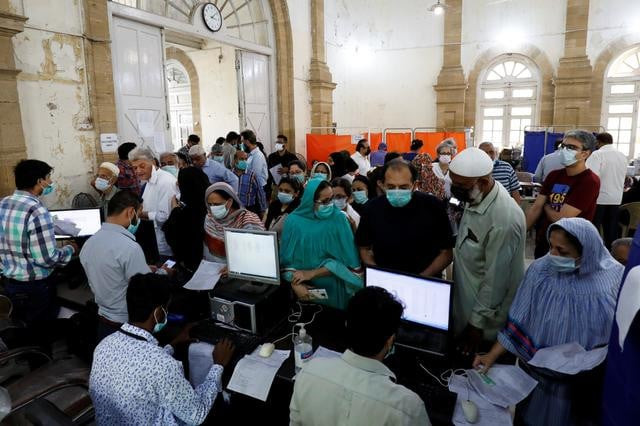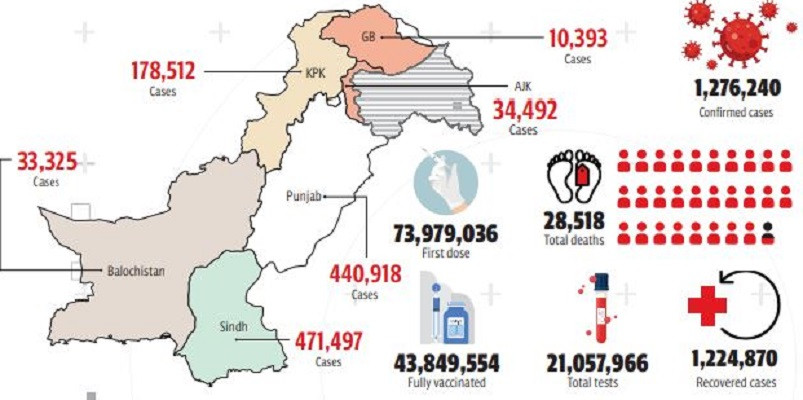New normal: Living with the superspreader
Changes brought about by coronavirus are expected to be much more long-lasting than anticipated

Two years on since the onset of the coronavirus and the new normal involves inoculation certificates, increased focus on sanitation, and the unprecedented power of the internet to keep everything ticking.
The raging pandemic which originated in neighboring China, first hit the country in February of 2020 after which curtailing its spread became a nightmare.
While the superspreader wreaked havoc in other countries, health experts opined that Pakistan had fared better than many.
However, the fear that Covid-19 evoked translated into nationwide lockdowns paralyzing the country’s businesses, educational institutions, and social life in general.
Despite the precautionary measures, the country’s confirmed cases, in the last two years, currently stand at more than 1.2 million out of which 28,518 individuals have lost their lives to the virus, as per the National Command and Operation Center’s (NCOC) website.
It should be noted that independent experts have argued that the actual infection rate and death count from the coronavirus is higher than that being reported. But for some the numbers do not matter, as they continue to grapple with virus induced post-traumatic stress disorder (PTSD).
Iqbal, a resident of Karachi and the provider of his family, describing his ordeal from nearly two years ago to The Express Tribune, said that he gets flashbacks to this day of the absolute terror he was living in.
“We are a family of eight people and all of us tested positive when the superspreader was gathering pace in the country. We spent a month quarantining at home and the mental turmoil we went through is indescribable,” he said.
At one point in time, health officials in the country believed that the virus would crumble the nation’s already weak healthcare system evidenced by a lack of ventilators or hospital beds for the critically ill.
As lawmakers grappled with how to avoid a catastrophe, street vendors had new commodities to sell to those violating strict lockdowns - facemasks, protective shields, and gloves.

DESIGN: MOHSIN ALAM
In true one man’s loss is another’s gain fashion as businesses like wedding halls, restaurants, and shopping outlets demanded normalcy online businesses thrived with contactless deliveries and cashless methods of payment.
Read More: Global Covid-19 cases near 250 million as Delta surge eases
Similarly, when offices and schools were shut down people began to rely on steady internet connections and computers to report for work or schooling and when air travel was halted, domestic tourism saw an upsurge. When the global outcry for a vaccine against the virus, that was tearing apart families and causing a worldwide economic slump, increased, the leading pharmaceutical companies delivered.
Professor Saeed Khan, from Dow University, while talking to The Express Tribune, remarked, “it usually takes many years to develop a vaccine against a disease.
To date, no vaccine has been developed and offered so quickly.” With the arrival of the vaccine came the naysayers, conspiracy theorists, and most importantly variants of the superspreader.
The highly transmissible Delta variant, originating in next door neighbor India where it caused massive casualties, pulverized the healthcare system, and caused lack of burial spaces, reminded the world that Covid-19 was not going anywhere anytime soon.
Delta’s strength and its onslaught so close to home woke up fears associated with the first wave of virus and amidst the din of the country’s health experts calling for immediate action, the government responded with nationwide lockdowns.
“All viruses mutate, and the coronavirus did too,” Saeed said.
However, the Delta mutation is at the back of the country’s mind now with rising dengue and inflation taking center stage. But the country’s inoculation campaign, after initially meeting vaccine procurement and hesitancy hurdles, is up and running with more than 73.9 million people getting the first dose and more than 43.8 million citizens fully vaccinated, as per the NCOC website.
Present day, as the mask mandate has disappeared and having a certificate indicating full inoculation has become valuable currency, Saeed believes that throwing caution to the wind is not advisable. Saeed, who resides in Karachi and is the head of the Dow’s Molecular Pathology Lab, warned of an imminent fifth wave of the superspreader aided by the cold weather.
“The fifth wave of the virus has some subtypes of the deadly Delta virus and is already gaining momentum in Britain, Russia, and Georgia,” he told The Express Tribune.



















COMMENTS
Comments are moderated and generally will be posted if they are on-topic and not abusive.
For more information, please see our Comments FAQ